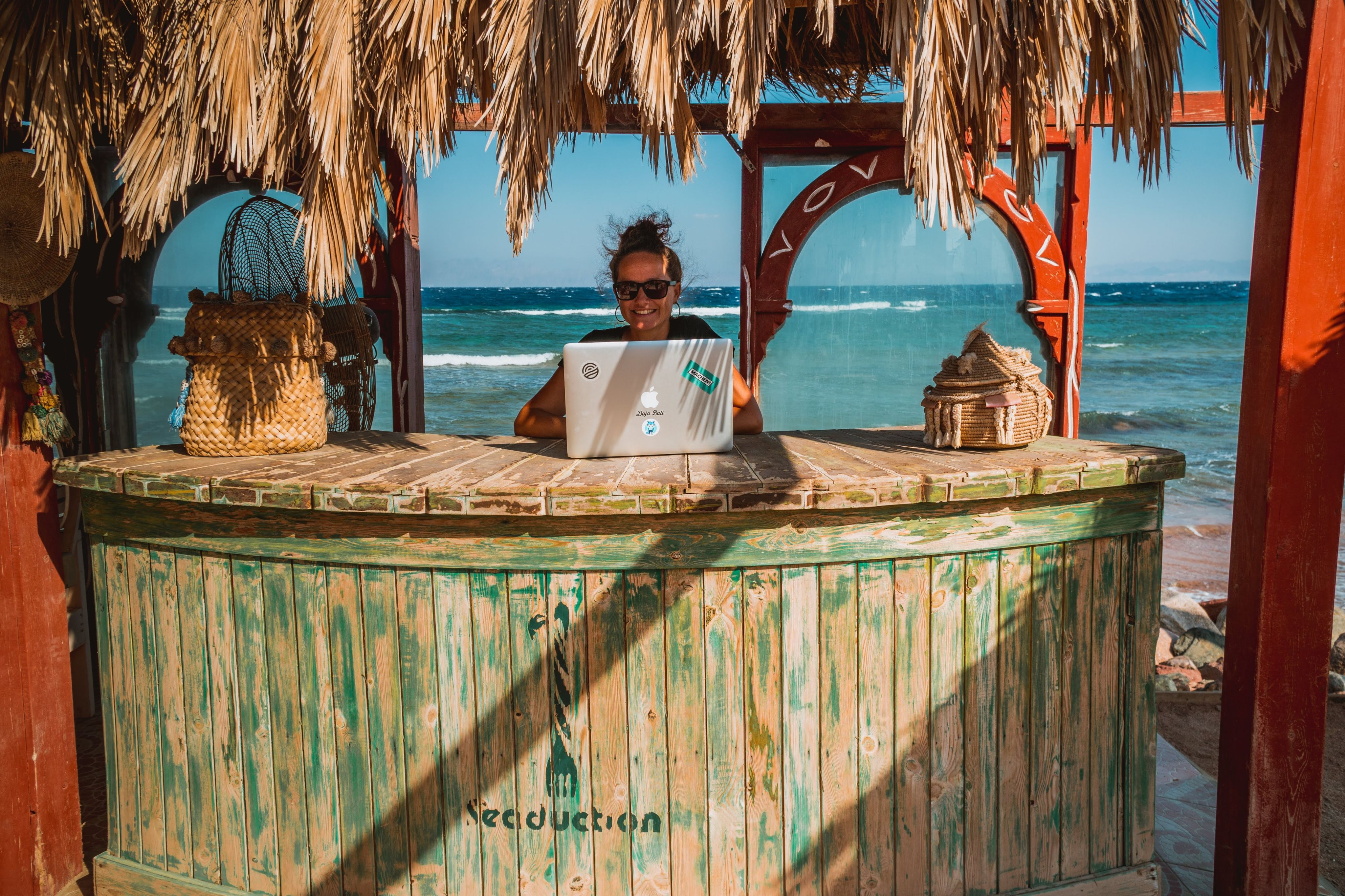Even You Can Be a Digital Nomad
Let's find out how

Digital Nomad:
"a person who earns a living working online in various locations of their choosing (rather than a fixed business location)."
Digital nomad is a growing trend.
Digital nomads are remote workers by definition, although not all remote workers are digital nomads. Remote working has grown in popularity recently, in large part due to the COVID-19 pandemic. This statistic is supported by MBO Partners' survey, which revealed a spike of over three million Americans who want to be digital nomads in the next two or three years, between 2019 and 2020.
Source: statista.com
Source: statista.com
Benefits of working remotely
In a subsequent survey in 2022, respondents were asked what the significant advantage of working remotely they saw. Consequently, the flexibility to have a flexible schedule was named as the most important benefit of remote work by 67 percent of respondents globally. The ability to work from any location came in second place.
Location, Location, Location.
Elina Geller (2022), a three-year digital nomad in 52 countries, recommends that the foremost consideration of being a digital nomad is location. Because digital nomads' job is entirely remote, picking a location with access to Wi-Fi and technology is essential. Furthermore, having a community of nomads to interact with is also essential. If you go to a city with a well-established nomad community, you'll have more built-in support.
Aside from the existence of the community, according to an online survey undertaken by abrotherabroad.com, the majority (56%) of the 4000 respondents surveyed stated that the cost of living is the most important factor for digital nomad locations worldwide. That explains why many of them picked areas with low per capita gross national income. To learn more about two important factors in choosing a location, let's compare the GDP per capita of the top ten nations visited by digital nomads.

Photo by GeoJango Maps on Unsplash
According to the survey results, the top 10 countries visited by digital nomads are located in the following three regions: North America, Europe, and Southeast Asia.
United States (16%)
Mexico (4%)
Spain (5%)
United Kingdom (4%)
Germany (4%)
France (4%)
Italy (3%)
Portugal (3%)
Thailand (5%)
Indonesia (2%)
Make a fortune from the living cost difference
It is a huge advantage for a digital nomad who comes from a high-income per capita country such as the US to live and settle in a country with a much lower one. These figures can generally depict the differences in the cost of living in each country. A substantial surplus might be viewed as the ability to live above the region's average standard. As an illustration, a person with a middling salary in Pittsburgh, Pennsylvania can live at a pretty high standard if he lives and dwells in Bali, Indonesia.
More information on these comparisons may be found on the internet. Using the identical example (Pittsburgh vs. Bali), the website numbeo.com shows that consumer costs in Bali are 53.76% cheaper than in Pittsburgh. To be more specific, on the same website, you can compare expenditures per item, such as apartment rental prices and the average price of one dish of food in a restaurant.
Time Difference Constraint
Being a digital nomad means being adaptable and not attached to a specific area. That flexibility may be ideal for people on vacation, but digital nomads must still be responsible for remote working. This type of remote working may differ from one another, but if the work is related to managers or clients who are geographically distant, time zone differences will be a significant challenge. Imagine you are a software engineer who has to attend a daily meeting in the morning US time while you are in Southeast Asia, where the time difference is around 12 hours. You will inevitably have to adapt your sleep cycle.
Jake Jorgovan (2017), a digital nomad who has tasted the bittersweet taste of time zones, shares his tips and experiences of working with clients largely in the United States while being in various parts of the world. One of his suggestions is to avoid phone calls as much as possible and manage as much communication as possible using email or video messaging. Jake suggested in his article that digital nomads actually can look at the time difference positively.
"While you are out exploring foreign countries during the day, you don’t have to worry about missing any client calls or emails because your clients aren’t even awake yet. While the occasional stickler client will screw up your sleep schedule, it is a small price to pay for the freedom of the digital nomad lifestyle."

Photo by Victoria Heath on Unsplash
The Remote Job
This second major consideration is equally important as location.

Remote work ecosystem post-pandemic
Aside from location, the second major concern is the remote work itself. This subject is not secondary to location, yet it is equally important. What's the point of looking for a decent location if we don't have a job that will support us financially for as long as we are nomads?
Working remotely and being a digital nomad may not be as unusual as it was three years ago, before the pandemic. Since 2020, remote work is no longer an unusual thing, since practically all workforces have likely experienced it or are at least familiar with the word. Remote work is largely expected to become ubiquitous in this post-pandemic environment. McKinsey & Company, for example, published an article in June 2022 headlined Americans are embracing flexible work—and they want more of it, which found that 58 percent (equivalent to 92 million individuals) of job holders in the United States can work remotely at least part of the time.
Such determination is not one-sided from the side of the worker. Ragu Bhargava, CEO of Global Upside, remarked in an article on forbes.com that employees will continue to resign if firms do not adapt to meet their expectations. Ragu then stated that those that continue to perceive remote work as transient or unconventional, rather than a genuine transformation in how we work, risk losing personnel and losing competitiveness as the workplace transforms around them.
What kind of job?
According to a survey done by thinkremote.com, digital nomads have the most positions in information technology, followed by creative services. This is in line with the results of another job survey conducted by abrotherabroad.com, which found that marketing, information technology, design, writing, and eCommerce accounted for the majority (51%) of the 4000 respondents' jobs. Despite the fact that certain professions have become prevalent among digital nomads, there are numerous success stories from different professions, for example, the remaining 49% are from abrotheabroad surveys. Blogging, nutritionists, virtual hosts, and other topics addressed in this post can all help digital nomads live their nomadic lifestyles. So the takeaway from this is that the opportunity to work as a nomad is broad and not limited to IT.
A Verdict
All in all, being a digital nomad is neither a bad idea nor an impossibility. As indicated by the growing trend of digital nomads, the favorable conditions that allow one to vacation while working flexibly have recently been more attractive for global workers. Furthermore, being able to indulge digital nomads with the above-average living standard is a tremendous benefit for people who come from relatively high-income countries.
The amount of information available and even online communities, as some of the articles linked in the discussion above are also very helpful for people to realize this idea. If you consider and decide to become a digital nomad, you don't need to gamble on that decision because everything can be measured and believed. This article starts with a discussion about the location because it can be the main motivation for you to dig up information about digital nomads. Finally, bring at least the following two messages from this article:
Think globally, the world is huge!
Do your own research!

Photo by Raimond Klavins on Unsplash
